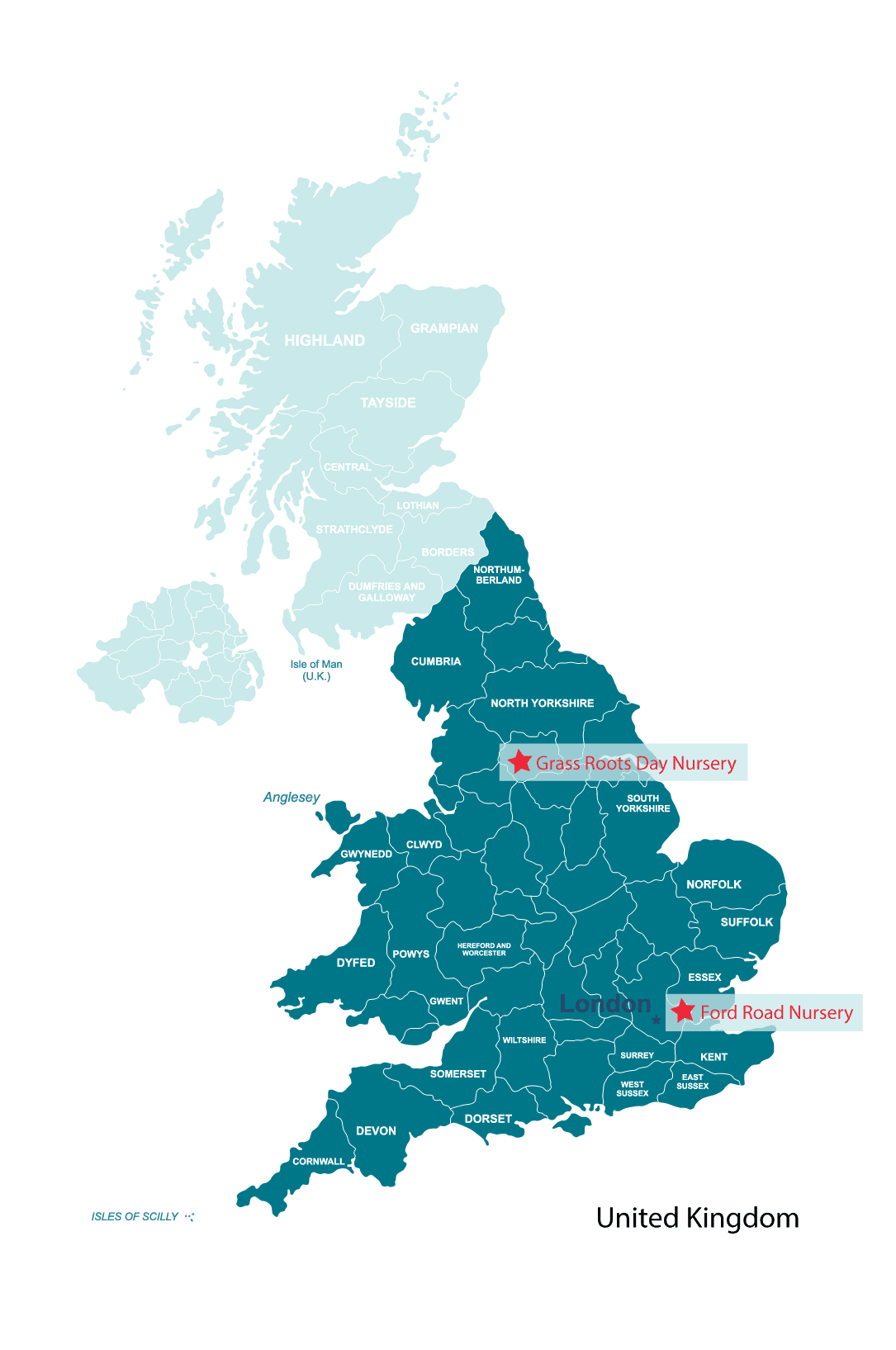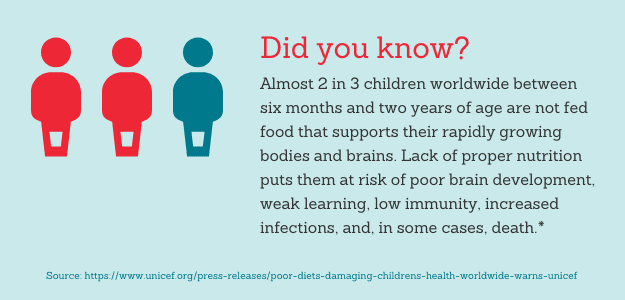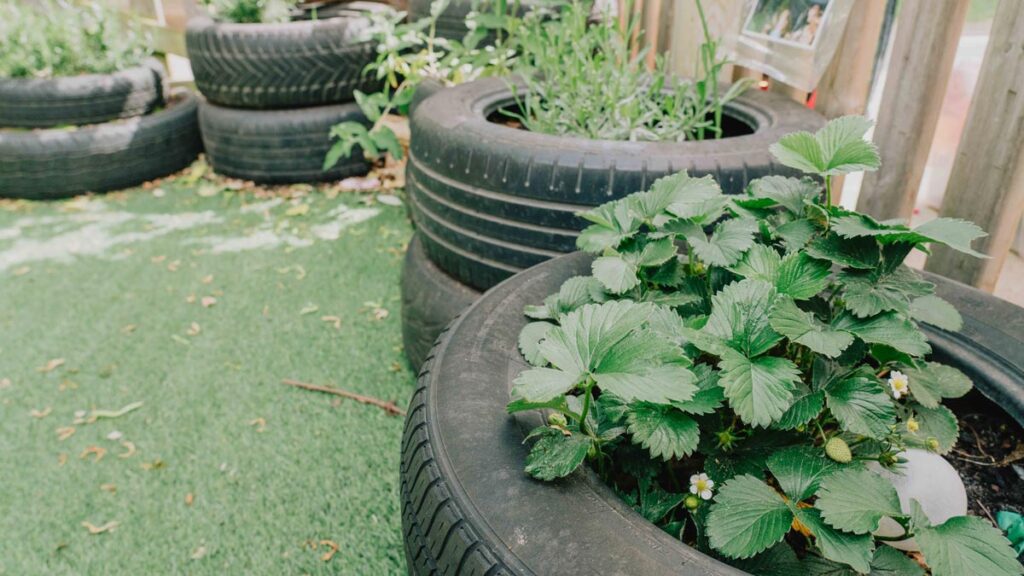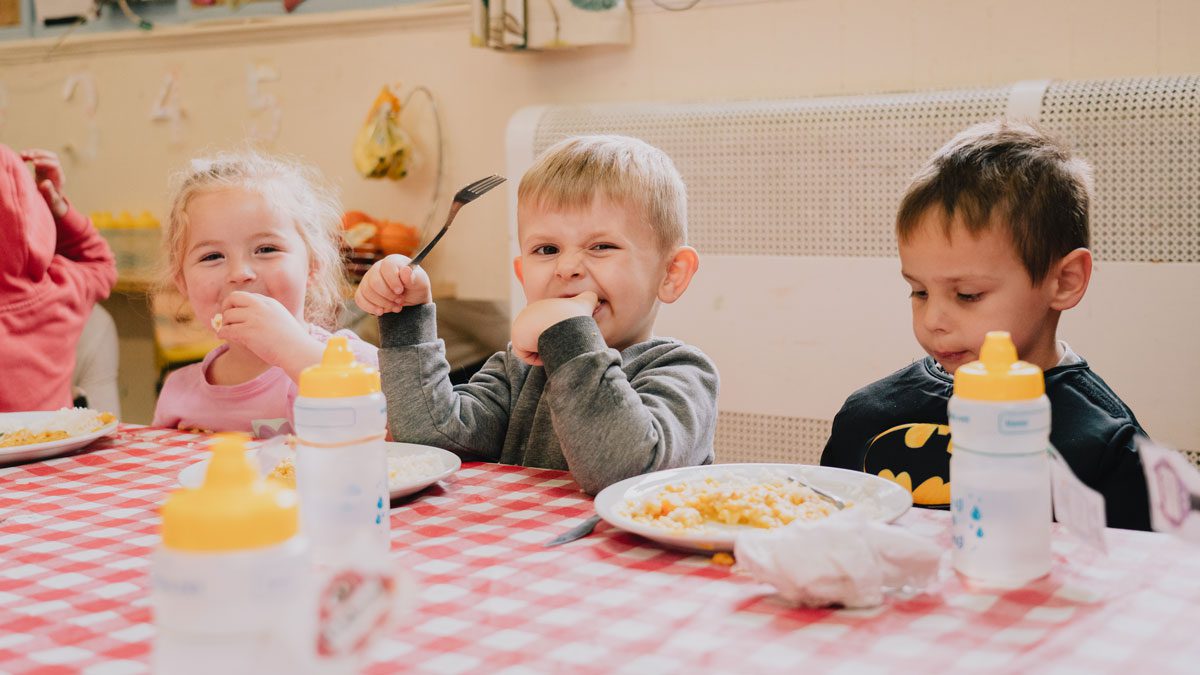Two UK Nurseries Find Creative Ways to Invite Children to Eat Healthier
Vitamin Angels UK and the National Day Nurseries Association (NDNA) have partnered since 2017, now reaching more than a thousand children annually with a supplementary feeding programme. Twelve participating nurseries throughout the United Kingdom receive weekly deliveries of self-selected fruits, vegetables, and protein-rich foods to serve children from low-income families who could benefit from increased access to better nutrition. Here’s a look at two participating nurseries.

Part One: Grass Roots Private Day Nursery
Sowerby Bridge, West Yorkshire, England

Hummus…smoothies…curry… veggie shepherd’s pie…pineapple muffins; Carol, “the cooker lady,” creates magic in the kitchen at Grass Roots Private Day Nursery. “There are a lot of underprivileged children. So to them, a meal is chicken nuggets and fries. It’s like, no, you won’t see that on my menu,” says Carol, chef at the nursery.
Sowerby Bridge is a small market town, nestled in West Yorkshire, England, home to just over 11,000 residents. It’s a picturesque village named after a historic bridge, where residents still honour the centuries-old Rushbearing Festival, where straw (rush) is strewn on the cold stone floors of churches to provide insulation and protect the knees of worshippers. Grass Roots rents the building from one of these churches to offer a warm, welcoming environment for some of the town’s children.

Over 24 percent of children in the Sowerby Bridge ward live in poverty, high compared to England’s overall 18.5 percent. Because poverty is often associated with food insecurity, The National Day Nurseries Association and Vitamin Angels UK are working together to increase access to nutritious foods for children. Nurseries like Grass Roots provide healthy meals and snacks throughout the day and send surplus food and recipes home with the children. For some, the nursery is the only place they get exposure to fruits and vegetables. The nursery staff use creative ways to encourage the children to try healthier, but unfamiliar, foods.
“I think the dynamic of Vitamin Angels has really changed the way we think of food in this setting. We offer the children a lot more play with the food. We’ve had the children being able to play with, make art pieces with the food, or they might just use it for mushing textures. There’s so much that comes out with it out with, you know, the benefits of playing with food. And I think our staff have really changed their view on food as well,” explains Lucy, Nursery Manager.
Tasty food paired with a bit of ingenuity is inspiring kids to eat more nutritious snacks and meals while at Grass Roots, and they are taking those habits home and sharing them with them their families, too.
“Our next challenge is definitely to start offering some services to families, whether it’s around making fresh, healthy meals at home, teaching them how to budget well, especially with prices going so expensive at the moment. It’d be really nice to offer and extend services, to help families see what healthy eating is and, and how they can incorporate it into the home,” says Lucy.
Part Two: Ford Road Nursery & Pre-School
Dagenham (London suburb), UK
You won’t find plastic play food at Ford Road Nursery & Pre-School. Or at any Leyf nurseries, for that matter — for this award-winning group of 39 London nurseries healthy eating is an essential pillar of their ethos. Pauline, Ford Road Nursery manager, explains, “introducing the food in the home corner is a major tool to get the children on board with eating the food. Cause if they’ve been left to have time to explore the food on their own terms, and it’s not mealtime so they can walk away at any point, there’s no pressure on them. So, that’s what really gives them chances to make a connection with their food.”

Leyf nurseries even has a chef training programme built to help nursery chefs understand children’s specific nutritional needs and how to encourage children to be adventurous in their tastes.
The play kitchen at Ford Road Nursery features real fruits and vegetables and knives to cut them with (butter knives, albeit)! Outside, kids are empowered to take part in food cultivation. “I’m trying to introduce growing our own vegetables. So we’ve got some carrot seeds; we’re gonna grow some carrots. So [they] get to plant the seeds, see it, grow, pull it out. And then they get to see the full cycle. We can give it to our chef, to probably put into a meal as well. And they could help prepare it by washing it and cutting it for the chef. So the home corner is to introduce the life skills as well as giving them the opportunity to see the vegetables from start to finish,” says teacher, Kerrie.

Nurturing early associations with healthy food extends beyond the nursery into the children’s homes and into adulthood. In London, this is especially important as unemployment rates rise and families have difficulty making ends meet, explains Pauline.
“So we are in a borough called Barking and Dagenham, and it’s an area of deprivation and it is the poorest borough within London. So many families have no employment and would be living on benefits or they may have jobs, but they’re traditionally very low-paid jobs. So the money they’ve got would barely cover their basic bills and with the price of basic bills rising, that might mean that families start to cut back on certain things that you need on a daily basis to live.”
With the help of Vitamin Angels UK and NDNA, Ford Road Nursery can provide healthy snacks and meals to about 130 children a week. Weekly deliveries of fruit, vegetables, and protein-rich foods help to fill the gaps in nutrition that some children may be experiencing at home. Pauline explains, “It’s really important for children to have a healthy start because statistics show us all the time that if you’re unhealthy as a child it is a very high incidence that you’re going to grow into an unhealthy adolescent, adult. And then obviously the cycle can go around to your own children as well.”
In partnership with nurseries like Ford Road and Grass Roots, VAUK and NDNA are working to make healthy habits and good nutrition accessible and fun.

